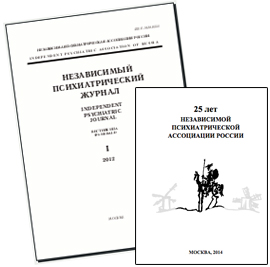Abstracts of №4, 2010
Latent forms of anti-psychiatry as main danger
Yu.S.Savenko
Key words: latent antipsychiatry, relativism
On the basis of analysis of main stands of antipsychiatric movement it was demonstrated that direct first-hand forms of antipsychiatry don’t destroy psychiatry, but, vice versa, develop and strengthen it. Fulling sanitary functions they allow to form ideal types of psychiatric science, profession and service.
Dangerous for psychiatry are indirect and latent forms of antipsychiatry. They originate from psychiatrists themselves, invisibly corrupt the subject, relativizing its base and conduct negative program of antipsychiatry. The types of various forms of reductionism are presented.
Position of civil commisssion on human rights
Roman Chorny
Key words: psychiatry and human rights, Civil Commission on Human Rights, antipsychiatry.
The President of St.Petersburg Civil Commission on Human Rights singled out principal, from the point of view of the Commission, types of violation of rights of persons with mental disorders in St.Petersburg and region and presented concrete examples: groundless involuntary hospitalization of citizens; damage to health of patients due to large doses of preparations and their long time use; cruel unjustified long term confinement in mental facilities; compelling women living in psychoneurological homes to abortions; refusal to give correct information on grounds for hospitalization, on implemented treatment and not informing patients of their rights.
Professional independence of doctor-psychiatrist and problem of distrust to psychiatric service in Russia
D.G.Bartenev
Key words: professional autonomy, law and ethics in psychiatry.
The ethical and legal guarantees of professional autonomy of psychiatrist in the course of providing mental health services have been formulated on the basis of international acts and provisions of Russian law. Decrease in professional independence which has been defined by the author not only as freedom of a psychiatrist from any outside administrative pressure but also as internal self-autonomy, has been demonstrated on the basis of concrete legal decisions in the mental health practice. The link between restrictions on professional autonomy of psychiatrist, lack of protection mechanisms including ethical committees, and as a consequence – growing distrust in mental health care in the modern Russia has been emphasized.
On trustworthiness in scientific researches
B.G.Yudin
Key words: trustworthiness in researches, plagiary, invention, falsification
Types of dishonesty of scientific researches have been discussed, such as plagiary, invention (forgery) and falsification. This problem began especially urgent since the beginning of 1980 and has been headily growing during the latest decade. The Independent committees, staff of whistleblowers and their protection have been created in the USA and European countries. The international cooperation has been developed, two world conferences have been held.
Ethico-legal problems of truthfulness in national psychiatry
A.Ya.Perekhov
Key words: medical secret, tight to information.
Discussed are various special incidents of conflict between secrecy and rights to information, access of the mentally ill to information about his illness. Dogmatic character of stereotyped solving these problems.
From an expert’s dossier
Key words: psychiatry and religion, use of psychiatry for non-medical purposes, independent evaluation.
Presented are the full text of conclusion of forensic psychiatric evaluation and its critical analysis from which it is completely evident that experts have been forced to carry out political order.
Role of different factors in development of recrudescences at chronic alcoholism
A.S.Meliksetian
Key words: remission, recrudescence, chronic alcoholism
The data on character and specific features of run of long and short remissions at chronic alcoholism, factors which actualize attraction and provoked recrudescence have been presented. Brief characteristics of examined patients, specific features of formation of alcohol addiction and its course, as well as development of pathological symptoms have been discussed.



